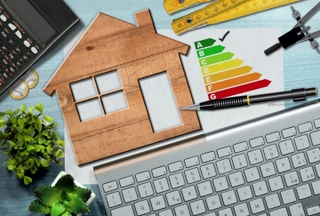Energy efficient home improvements guide
07 December 2020

This year, we’ve all spent a lot more time at home than expected. And with that, comes a lot more scrutiny - especially when it comes to home heating and energy efficiency.
Suddenly, we’re privy to a whole host of things that once went unnoticed. Pesky draughts and cold rooms mean the heating stays on longer using more energy, resulting in higher energy bills. Sound familiar? We’re here to help.
If you’ve noticed that your home isn’t as energy efficient as it could be, or you want to maximise your home’s efficiency as we move into winter, this guide is for you.
We’ve split our guide into three simple sections: insulating your home, upgrading your heating system and generating your own energy. And in the spirit of 2020, we’ve also shared a few ideas for how you can do it yourself.
Insulating your home
Step one. Regardless of your heating system, it'll work harder if your home isn’t well insulated. So, let’s start with the basics.
Draught-proofing
Draught-proofing is one of the most cost effective ways of making your home energy efficient and keeping your energy bills low. Heat can escape from your home through small gaps in windows and doors. Draught-proofing is all about limiting the areas through which your home’s heat can escape.
Do it yourself
Feeling handy? All you’ll need is some draught seal tape, a steady hand and a bit of patience. Draught seal tape should cost under £15 for ten meters, which’ll be enough to get a few doors and windows sealed. This could save you around £20 on your energy bill every year.*
Double glazing
Sealing gaps might be enough to insulate your home, but if your windows and doors are single-glazed, you’ll probably need to upgrade them to make your home as energy efficient as can be.
It's no secret that single glazing isn’t the best at retaining heat. Investing in upgrading your doors and windows is no small task. But the long-term benefits speak for themselves. Upgrading to the most energy efficient double glazing could save you a massive £85 on your energy bill annually.*
Plus, double-glazing will provide noise insulation from the outside, so you can enjoy peace and quiet throughout your home. If you’re not quite ready to take the plunge, consider starting off by upgrading windows that are near sources of heat, as they’ll be the most effective.
Insulating your loft or walls
If your home is already double-glazed and sufficiently draught-proof, you’re off to a great start. Insulating your loft and walls will take you to the next level of energy efficiency. Up to a quarter of your home’s heat can be lost through the roof if it’s uninsulated. So, insulating your roof is a great way of ensuring that you don’t waste energy or money - and the effects can last up to 40 years.
Do it yourself
If your loft is safe, free of damp, and you’re a competent DIY-er can insulate it yourself (unless you have a flat roof loft). In most cases, you can use mineral wool insulation, which will set you back around £300. But here’s the great part. Your annual savings on your energy bill could be up to £150.*
Only attempt to do this yourself if you feel confident, you have safe access to and from the loft and your loft is stable and secure. It’s best to wear gloves, and keep the area free of trip hazards. Always seek professional advice if you’re unsure, and remember that you can always ask the professional to do the task for you.
Upgrading your heating system
Boiler maintenance and bleeding radiators
So, you’ve insulated your home. What next? Once you’re confident that your house is retaining heat, it’s time to take a look at the heart of the home - your boiler.
On average, boilers have a lifespan of around 15 years, and in order to keep them running smoothly, it’s best to get your boiler serviced. Having an annual boiler service helps reduce the risk of needing costly repairs or a boiler replacement.
Do it yourself
Bleeding your radiators can help ensure that your home energy is being used efficiently. Radiators can get air bubbles trapped inside them, which means your boiler has to work harder to keep your home warm, and you end up using more energy than you need to. Bleeding your radiators removes these bubbles, so your boiler can run as it should. Plus, it only takes a few minutes.
Follow our guide on how to bleed your radiators.New boiler
In some cases, you might need an entirely new boiler. If your boiler is old, or you’ve had consistent problems with your heating system, it might be time for an upgrade. This can be an investment, but if done right, you can save yourself money and stress over the long-run.Smart thermostat
Sometimes, making your home more energy efficient requires a better understanding of your energy habits. Smart thermostats learn your household heating habits (tongue twister), and help you stay in control by allowing you to schedule your heating on and off.